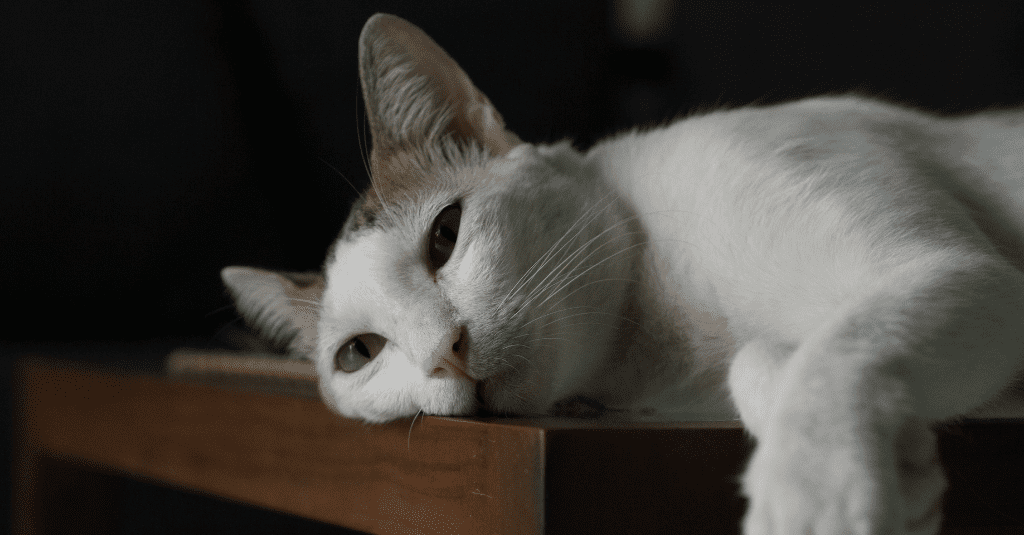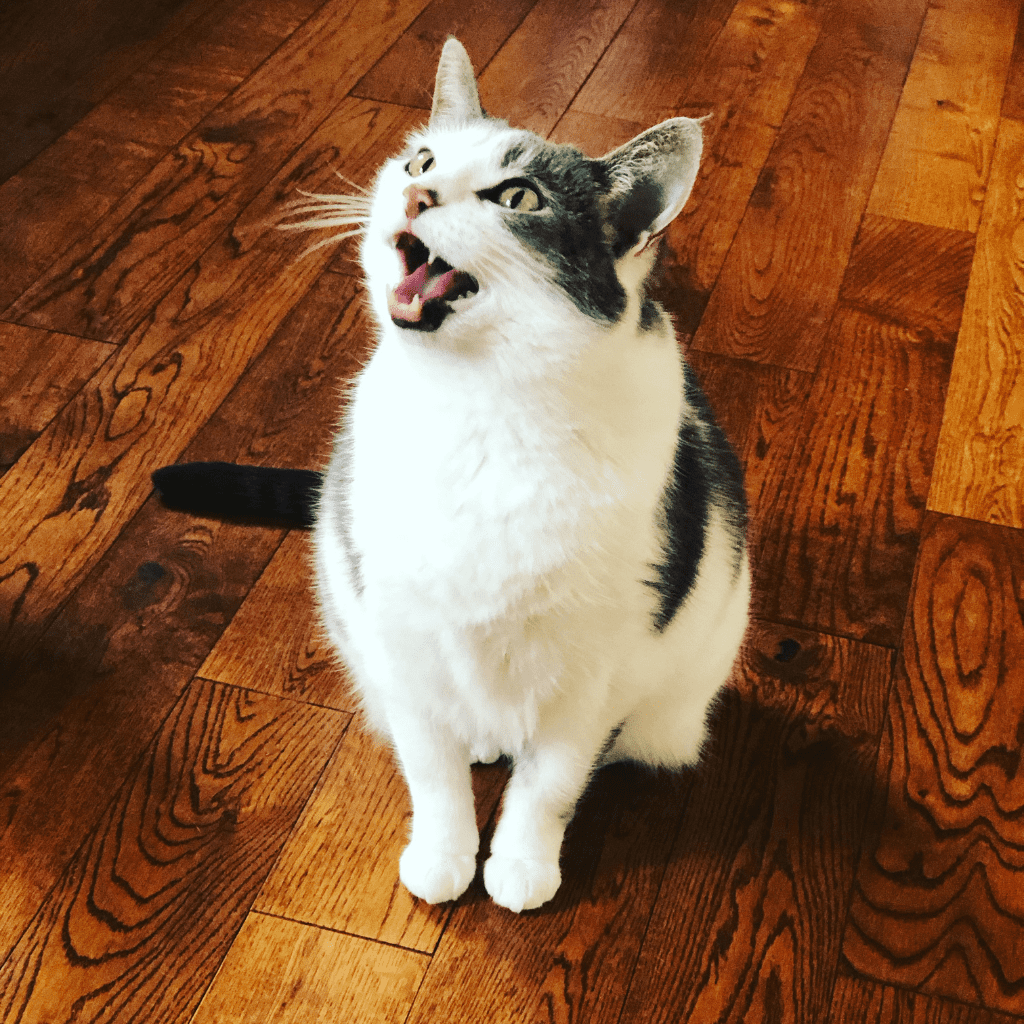kidney & bladder support

free shipping over $100 (USA & Canada)
1-877-937-4372 the pet expert hotline

Natural Help for Stress Reduction, Anxiety Relief, Behavioral Problems, and Aggression in Cats


Is your family getting ready for school to start again, and you’re starting to notice signs of separation anxiety in cats in your home? While most of us are familiar with this behavioral issue in our canine companions, have you ever wondered if our feline friends can experience similar emotions? As we prepare to spend more time outside the house, it’s important to consider how our absence might affect the health and well-being of our beloved cats. Let’s dive into this often-overlooked topic and explore ways to ensure your furry friends are content even when you’re not around.
The lazy days of summer are coming to an end. It’s time to get back into the routine of school and work. As our schedules change, so do our pets’ lives. Cats, known for their independent nature, might not seem as affected by our absence. However, it’s essential to understand that they, too, can experience emotions tied to being alone for extended periods.
While cats are generally more solitary animals compared to dogs, it’s a misconception that they don’t feel loneliness. Cats can form strong bonds with their human companions and even with other pets in the household. If your cat is used to having your company throughout the day and suddenly finds itself alone for extended hours, they might experience a sense of unease or even stress.
If you know your routine is about to change, you can help avoid stress with the help of natural supplements, environmental changes, increased playtime, and extra affection.
These are some easy steps you can take to help your cat adjust to your changing schedule and minimize separation anxiety:
Remember, every cat is unique! Some might adjust to longer alone times more easily than others. So, please pay attention to your cat’s behavior and emotions for signs of distress, and be prepared to make necessary adjustments to ensure their well-being.

Cats communicate in subtle ways. Some common signs of feline stress include excessive meowing, changes in appetite, hiding for prolonged periods, increased grooming, and litter box issues. Keep an eye out for these changes! As they might indicate that your cat is struggling with the shift in routine.
Stress can also manifest in various ways, possibly triggering other health concerns like urinary tract infections (UTIs). Stress can weaken the immune system and affect the bladder, making cats more susceptible to urinary tract disorders. If you notice your cat struggling in the litter box, urinating outside the box, or displaying signs of discomfort, consult your veterinarian promptly.
If you suspect stress-induced urinary issues in your kitty, consult with your trusted vet and discuss a natural solution like NHV Tripsy. This herbal blend was designed to keep the kidneys and urinary tract healthy.
Now that you know what signs of separation anxiety in cats look like spare some thought for your feline friend. By understanding their needs and taking steps to prevent and address separation anxiety, you can ensure that they remain happy, healthy, and stress-free even when you’re not by their side. Here’s to a smooth transition for both you and your furry companion from our team of Pet Experts at NHV!
kidney & bladder support

Supplement for kidney, renal and bladder problems in cats
buy 2 and save $3
3 month supply for a small to medium size

Specially formulated to gently and effectively promote proper urinary health as well as easing uncomfortable urination that often accompanies kidney problems in cats. With seven powerful ingredients, this supplement is highly effective in helping your cat’s urinary system.
NHV Tripsy for kidney problems in cats also helps to:
Many cats can suffer from kidney, renal and urinary disorders that can be uncomfortable. Kidney stones form when the body is unable to properly metabolize minerals due to a poor diet. If untreated, this may eventually lead to kidney failure, so making sure your feline family member gets adequate nutrition is vital.
NHV’s Tripsy is also safe to be given along with conventional treatments for kidney problems in cats. You can read about a recent evaluation done on the healing components of this powerful supplemental blend and how it alleviates bladder problems in cats.
Finding the right blend of kidney supplements for cats is easy online at NHV. If you have questions or concerns, you can always schedule a consultation because at NHV we want to provide you with the best service to help your cat live a healthy purrfect life naturally.
Stone Root – Acts as a tonic for the capillaries and prevents the formation of kidney calculi.
Parsley Piert – Aids digestion. Also used to aid fever, kidney stones, bladder stones and fluid retention.
Wild Hydrangea – May help with discomfort while increasing the flow of urine and eliminating swelling and fluid retention.
Gravel Root – Restores and cleanses the genitourinary (reproductive and urinary) organs.
Echinacea Purpurea – Contains strong immune-stimulating properties.
Marshmallow – An anti-inflammatory that controls bacterial infections and soothes and softens irritated tissues.
Oregon Grape – Helps relieve indigestion and malabsorption. Also has antibiotic and immunostimulatory properties.
Select your pet's weight to determine the correct dose.
To be taken twice daily. Determine your pet’s weight and then use the easy chart below to determine the correct dose. This is the minimum dosage.
Pet's Weight Dosage
0 - 15 lb = 0.5 ml
16 - 30 lb = 1.0 ml
31 - 45 lb = 1.5 ml
46 - 60 lb = 2.0 ml
61 - 75 lb = 2.5 ml
Over 75 lb = 3.0 ml
How to Administer
Shake well before use. The easiest method is to use the dropper provide and places the drops into your pet’s food or favorite treat. You can also use the dropper and squirt directly into the pet’s mouth.
Some pets can be finicky, if this occurs consider hiding the drops in foods most pet’s love such as fish, chicken or yogurt or a favourite treat. If your pet only eats dry food then soak a few kibbles at feeding time.
For Best Results
Herbal dietary supplements are beneficial to the health and wellbeing of your pet and are safe for long-term use. Every pet responds to natural herbal supplements differently, therefore it is important to be consistent and administer the product daily. Supplements generally take two to four weeks to take effect, however this will vary from one animal to the next.
Product Storage
All NHV Natural Pet Products are pure herbal extracts and contain no artificial additives, preservatives or coloring. Shelf life after opening is 6 months and must be refrigerated after opening.
Cautions and Contraindications
Do not use Tripsy if your pet is pregnant. No known side effects. Speak to your vet before using our products. A second visit is recommended if your pet’s condition does not improve, or deteriorates after continued use of the supplements.
All information provided by NHV Natural Pet Products is for educational purposes only.
Specially formulated to gently and effectively promote proper urinary health as well as easing uncomfortable urination that often accompanies kidney problems in cats. With seven powerful ingredients, this supplement is highly effective in helping your cat’s urinary system.
NHV Tripsy for kidney problems in cats also helps to:
Many cats can suffer from kidney, renal and urinary disorders that can be uncomfortable. Kidney stones form when the body is unable to properly metabolize minerals due to a poor diet. If untreated, this may eventually lead to kidney failure, so making sure your feline family member gets adequate nutrition is vital.
NHV’s Tripsy is also safe to be given along with conventional treatments for kidney problems in cats. You can read about a recent evaluation done on the healing components of this powerful supplemental blend and how it alleviates bladder problems in cats.
Finding the right blend of kidney supplements for cats is easy online at NHV. If you have questions or concerns, you can always schedule a consultation because at NHV we want to provide you with the best service to help your cat live a healthy purrfect life naturally.
Stone Root – Acts as a tonic for the capillaries and prevents the formation of kidney calculi.
Parsley Piert – Aids digestion. Also used to aid fever, kidney stones, bladder stones and fluid retention.
Wild Hydrangea – May help with discomfort while increasing the flow of urine and eliminating swelling and fluid retention.
Gravel Root – Restores and cleanses the genitourinary (reproductive and urinary) organs.
Echinacea Purpurea – Contains strong immune-stimulating properties.
Marshmallow – An anti-inflammatory that controls bacterial infections and soothes and softens irritated tissues.
Oregon Grape – Helps relieve indigestion and malabsorption. Also has antibiotic and immunostimulatory properties.
Select your pet's weight to determine the correct dose.
To be taken twice daily. Determine your pet’s weight and then use the easy chart below to determine the correct dose. This is the minimum dosage.
Pet's Weight Dosage
0 - 15 lb = 0.5 ml
16 - 30 lb = 1.0 ml
31 - 45 lb = 1.5 ml
46 - 60 lb = 2.0 ml
61 - 75 lb = 2.5 ml
Over 75 lb = 3.0 ml
How to Administer
Shake well before use. The easiest method is to use the dropper provide and places the drops into your pet’s food or favorite treat. You can also use the dropper and squirt directly into the pet’s mouth.
Some pets can be finicky, if this occurs consider hiding the drops in foods most pet’s love such as fish, chicken or yogurt or a favourite treat. If your pet only eats dry food then soak a few kibbles at feeding time.
For Best Results
Herbal dietary supplements are beneficial to the health and wellbeing of your pet and are safe for long-term use. Every pet responds to natural herbal supplements differently, therefore it is important to be consistent and administer the product daily. Supplements generally take two to four weeks to take effect, however this will vary from one animal to the next.
Product Storage
All NHV Natural Pet Products are pure herbal extracts and contain no artificial additives, preservatives or coloring. Shelf life after opening is 6 months and must be refrigerated after opening.
Cautions and Contraindications
Do not use Tripsy if your pet is pregnant. No known side effects. Speak to your vet before using our products. A second visit is recommended if your pet’s condition does not improve, or deteriorates after continued use of the supplements.
All information provided by NHV Natural Pet Products is for educational purposes only.
stress & anxiety support

Natural Support for Canine Stress and Anxiety
buy 2 and save $3
3 month supply for a small to medium size pet
Everyone knows what stress feels like, and we all know that too much stress can make us ill—high blood pressure, ulcers and even cancer can result from excessive stress. Like us, dogs can get stressed by numerous factors as well. Help your furkiddo relax into a long and happy life with NHV Lesstress - a natural dog stress support.


Everyone knows what stress feels like, and we all know that too much stress can make us ill—high blood pressure, ulcers and even cancer can result from excessive stress. Like us, dogs can get stressed by numerous factors as well. Help your furkiddo relax into a long and happy life with NHV Lesstress - a natural dog stress support.

Natural Dog Stress Reliever Supplemental Support
With a heightened sense of hearing and smell, small events that seem mundane to us can be terrifying and stressful for your dogs. Sometimes the stress is from the ride to the office, or maybe they are missing their human companions. This all contributes to changes in behavior like excessive panting, drooling, sweaty paws, dilated eyes, pacing, excessively shedding, or just completely shutting down. Some dogs become so stressed that it may lead to fear and aggression.
Other forms of stress in a dog’s life include:
In addition to panting, excessive barking/whining, chewing on themselves, shivering (when it’s not cold), panicked tail wagging, or tense muscles, stress can also cause GI tract issues such as diarrhea or vomiting.
The key to a healthy pup is balance. Too much or too little activity can be harmful, as well as too much or too little socialization. A balanced, clean diet also helps maintain the body and the mind. If your dog is susceptible to stress, you can use calming herbs like those found in NHV Lesstress. This formulation gently acts on the nervous system and immune system to provide a natural dog stress reliever.
How NHV’s Natural Dog Stress Relief Eases Stress and Anxiety
For stressful experiences such as separation anxiety, the loss or addition of a furry friend, special events (eg. fireworks) and illness (stress can cause conditions to worsen), the natural (non-addictive) sedative properties of Lesstress gently relax the nervous system and endocrine system. Ingredients like Chamomile, Passion Flower and Lemon Balm work to calm nerves while ingredients like Reishi, Eleuthero, and Echinacea Angustifolia are very beneficial for helping the body adapt to stress and illness and stimulate healthy immune function.
Help Support Your Dog Naturally
All NHV supplements like Lesstress are 100% natural and created by a holistic veterinarian and a master herbalist, specially formulated for pets. Feel free to contact our veterinary professionals to get more insight into your little one’s health and wellbeing.
Made with the finest, organically grown, or ethically harvested herbs. Made specifically for pets, vet-formulated and vet approved.
Lesstress for Dogs
Select your pet's weight to determine the correct dose.
To be taken twice daily. Determine your pet’s weight and then use the easy chart below to determine the correct dose. This is the minimum dosage.
Pet's Weight Dosage
0 - 15 lb = 0.5 ml
16 - 30 lb = 1.0 ml
31 - 45 lb = 1.5 ml
46 - 60 lb = 2.0 ml
61 - 75 lb = 2.5 ml
Over 75 lb = 3.0 ml
For small animals (rabbits, ferrets), avians and reptiles use 1 drop for every 2 lb of body weight.
How to Administer
Shake well before use.
The easiest method is to use the dropper provide and places the drops into your pet’s food or favorite treat. You can also use the dropper and squirt directly into the pet’s mouth.
Some pets can be finicky, if this occurs consider hiding the drops in foods most pet’s love such as fish, chicken or yogurt or a favourite treat. If your pet only eats dry food then soak a few kibbles at feeding time.
For Best Results
Herbal dietary supplements are beneficial to the health and wellbeing of your pet and are safe for long-term use. Every pet responds to natural herbal supplements differently, therefore it is important to be consistent and administer the product daily. Supplements generally take two to four weeks to take effect, however this will vary from one animal to the next.
Product Storage
All NHV Natural Pet Products are pure herbal extracts and contain no artificial additives, preservatives or coloring. Shelf life after opening is 6 months and must be refrigerated after opening.
Cautions and Contraindications
Do not use Lesstress in pregnant or nursing animals.
Speak to your vet before using our products. A second visit is recommended if your pet’s condition does not improve, or deteriorates after continued use of the supplements.
All information provided by NHV Natural Pet Products is for educational purposes only.
Natural Dog Stress Reliever Supplemental Support
With a heightened sense of hearing and smell, small events that seem mundane to us can be terrifying and stressful for your dogs. Sometimes the stress is from the ride to the office, or maybe they are missing their human companions. This all contributes to changes in behavior like excessive panting, drooling, sweaty paws, dilated eyes, pacing, excessively shedding, or just completely shutting down. Some dogs become so stressed that it may lead to fear and aggression.
Other forms of stress in a dog’s life include:
In addition to panting, excessive barking/whining, chewing on themselves, shivering (when it’s not cold), panicked tail wagging, or tense muscles, stress can also cause GI tract issues such as diarrhea or vomiting.
The key to a healthy pup is balance. Too much or too little activity can be harmful, as well as too much or too little socialization. A balanced, clean diet also helps maintain the body and the mind. If your dog is susceptible to stress, you can use calming herbs like those found in NHV Lesstress. This formulation gently acts on the nervous system and immune system to provide a natural dog stress reliever.
How NHV’s Natural Dog Stress Relief Eases Stress and Anxiety
For stressful experiences such as separation anxiety, the loss or addition of a furry friend, special events (eg. fireworks) and illness (stress can cause conditions to worsen), the natural (non-addictive) sedative properties of Lesstress gently relax the nervous system and endocrine system. Ingredients like Chamomile, Passion Flower and Lemon Balm work to calm nerves while ingredients like Reishi, Eleuthero, and Echinacea Angustifolia are very beneficial for helping the body adapt to stress and illness and stimulate healthy immune function.
Help Support Your Dog Naturally
All NHV supplements like Lesstress are 100% natural and created by a holistic veterinarian and a master herbalist, specially formulated for pets. Feel free to contact our veterinary professionals to get more insight into your little one’s health and wellbeing.
Made with the finest, organically grown, or ethically harvested herbs. Made specifically for pets, vet-formulated and vet approved.
Lesstress for Dogs
Select your pet's weight to determine the correct dose.
To be taken twice daily. Determine your pet’s weight and then use the easy chart below to determine the correct dose. This is the minimum dosage.
Pet's Weight Dosage
0 - 15 lb = 0.5 ml
16 - 30 lb = 1.0 ml
31 - 45 lb = 1.5 ml
46 - 60 lb = 2.0 ml
61 - 75 lb = 2.5 ml
Over 75 lb = 3.0 ml
For small animals (rabbits, ferrets), avians and reptiles use 1 drop for every 2 lb of body weight.
How to Administer
Shake well before use.
The easiest method is to use the dropper provide and places the drops into your pet’s food or favorite treat. You can also use the dropper and squirt directly into the pet’s mouth.
Some pets can be finicky, if this occurs consider hiding the drops in foods most pet’s love such as fish, chicken or yogurt or a favourite treat. If your pet only eats dry food then soak a few kibbles at feeding time.
For Best Results
Herbal dietary supplements are beneficial to the health and wellbeing of your pet and are safe for long-term use. Every pet responds to natural herbal supplements differently, therefore it is important to be consistent and administer the product daily. Supplements generally take two to four weeks to take effect, however this will vary from one animal to the next.
Product Storage
All NHV Natural Pet Products are pure herbal extracts and contain no artificial additives, preservatives or coloring. Shelf life after opening is 6 months and must be refrigerated after opening.
Cautions and Contraindications
Do not use Lesstress in pregnant or nursing animals.
Speak to your vet before using our products. A second visit is recommended if your pet’s condition does not improve, or deteriorates after continued use of the supplements.
All information provided by NHV Natural Pet Products is for educational purposes only.
kidney & bladder support

Tripsy, Milk Thistle & Yucca
bundle and save with pet expert kits
3 month supply for a small to medium size pet.
Some of our furry friends get abandoned in their golden years due to recurring health issues like having accidents in the house. If they are suffering from bladder stones or a UTI, they may need to use the bathroom more frequently and can’t always hold it! Our Bladder Strength and Urinary Tract Health Kit contains a bundle of supplements that are formulated to help control and naturally eliminate infections, help soothe inflammation and promote urinary tract health.


Some of our furry friends get abandoned in their golden years due to recurring health issues like having accidents in the house. If they are suffering from bladder stones or a UTI, they may need to use the bathroom more frequently and can’t always hold it! Our Bladder Strength and Urinary Tract Health Kit contains a bundle of supplements that are formulated to help control and naturally eliminate infections, help soothe inflammation and promote urinary tract health.

Let’s face it, no one wants to see their furkiddos suffer. A common health problem amongst our furbabies is bladder stones (struvite and oxalate) or a urinary tract infection (which is usually in the bladder). Stones may be caused by an infection, kidney or liver disease, genetics, high blood calcium levels, or a poor diet. To help your little one’s body flush out the stones, our Bladder Strength and Urinary Tract Health Kit contains Tripsy, Milk Thistle and Yucca to help promote gentle detoxification, help soothe inflammation, and promote healthy urine flow.
Bladder stones and urinary issues can cause a lot of discomfort and stress for your little one. A feline urinary tract infection and dog bladder infection symptoms may include: bloody urine, straining to pee, frequent urination and a strong odor.
Breeds at a higher risk of developing bladder stones are: the Shih Tzu, Yorkshire Terrier, Labrador Retriever, and Dachshund.
Your furkiddo’s health and wellness means everything to us. For our pet bladder and urinary tract health kits, we have worked with a holistic veterinarian and a master herbalist to formulate gentle yet effective remedies to focus on the areas of the body most affected by cat and dog bladder infection symptoms or urinary crystals. For any questions or concerns about your little one’s urinary tract health, don’t hesitate to reach out to an NHV Pet Expert - we are here to help!
Made with the finest, organically grown, or ethically harvested herbs. Made specifically for pets, vet-formulated and vet approved.
Tripsy™
Milk Thistle
Yucca
Select your pet's weight to determine the correct dose.
To be taken twice daily. Determine your pet’s weight and then use the easy chart below to determine the correct dose. This is the minimum dosage.
Pet's Weight Dosage
0 - 15 lb = 0.5 ml
16 - 30 lb = 1.0 ml
31 - 45 lb = 1.5 ml
46 - 60 lb = 2.0 ml
61 - 75 lb = 2.5 ml
Over 75 lb = 3.0 ml
For small animals (rabbits, ferrets), avians and reptiles use 1 drop for every 2 lb of body weight.
How to Administer
Shake well before use. The easiest method is to use the dropper provided and place the drops into your pet’s food or favorite treat. You can also use the dropper and squirt directly into the pet’s mouth. Some pets can be finicky, if this occurs consider hiding the drops in foods most pet’s love such as fish, chicken or yogurt or a favorite treat. If your pet only eats dry food then soak a few kibbles at feeding time.
For Best Results
Herbal dietary supplements are beneficial to the health and well-being of your pet and are safe for long-term use. Every pet responds to natural herbal supplements differently, therefore it is important to be consistent and administer the product daily. Supplements generally take two to four weeks to take effect, however this will vary from one animal to the next.
Product Storage
All NHV Natural Pet Products are pure herbal extracts and contain no artificial additives, preservatives or coloring. Shelf life after opening is 6 months and must be refrigerated after opening.
All information provided by NHV Natural Pet Products is for educational purposes only.
Let’s face it, no one wants to see their furkiddos suffer. A common health problem amongst our furbabies is bladder stones (struvite and oxalate) or a urinary tract infection (which is usually in the bladder). Stones may be caused by an infection, kidney or liver disease, genetics, high blood calcium levels, or a poor diet. To help your little one’s body flush out the stones, our Bladder Strength and Urinary Tract Health Kit contains Tripsy, Milk Thistle and Yucca to help promote gentle detoxification, help soothe inflammation, and promote healthy urine flow.
Bladder stones and urinary issues can cause a lot of discomfort and stress for your little one. A feline urinary tract infection and dog bladder infection symptoms may include: bloody urine, straining to pee, frequent urination and a strong odor.
Breeds at a higher risk of developing bladder stones are: the Shih Tzu, Yorkshire Terrier, Labrador Retriever, and Dachshund.
Your furkiddo’s health and wellness means everything to us. For our pet bladder and urinary tract health kits, we have worked with a holistic veterinarian and a master herbalist to formulate gentle yet effective remedies to focus on the areas of the body most affected by cat and dog bladder infection symptoms or urinary crystals. For any questions or concerns about your little one’s urinary tract health, don’t hesitate to reach out to an NHV Pet Expert - we are here to help!
Made with the finest, organically grown, or ethically harvested herbs. Made specifically for pets, vet-formulated and vet approved.
Tripsy™
Milk Thistle
Yucca
Select your pet's weight to determine the correct dose.
To be taken twice daily. Determine your pet’s weight and then use the easy chart below to determine the correct dose. This is the minimum dosage.
Pet's Weight Dosage
0 - 15 lb = 0.5 ml
16 - 30 lb = 1.0 ml
31 - 45 lb = 1.5 ml
46 - 60 lb = 2.0 ml
61 - 75 lb = 2.5 ml
Over 75 lb = 3.0 ml
For small animals (rabbits, ferrets), avians and reptiles use 1 drop for every 2 lb of body weight.
How to Administer
Shake well before use. The easiest method is to use the dropper provided and place the drops into your pet’s food or favorite treat. You can also use the dropper and squirt directly into the pet’s mouth. Some pets can be finicky, if this occurs consider hiding the drops in foods most pet’s love such as fish, chicken or yogurt or a favorite treat. If your pet only eats dry food then soak a few kibbles at feeding time.
For Best Results
Herbal dietary supplements are beneficial to the health and well-being of your pet and are safe for long-term use. Every pet responds to natural herbal supplements differently, therefore it is important to be consistent and administer the product daily. Supplements generally take two to four weeks to take effect, however this will vary from one animal to the next.
Product Storage
All NHV Natural Pet Products are pure herbal extracts and contain no artificial additives, preservatives or coloring. Shelf life after opening is 6 months and must be refrigerated after opening.
All information provided by NHV Natural Pet Products is for educational purposes only.
Published: August 25, 2023